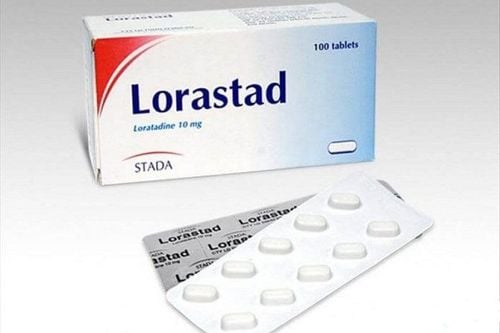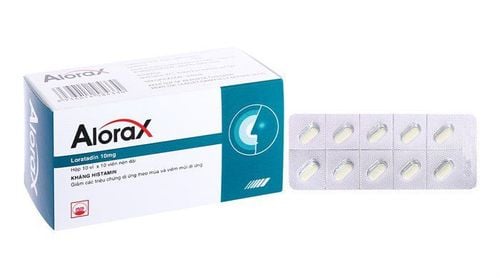This is an automatically translated article.
Maybe many people do not know what Ezinapc is and what disease it is used to treat? So let's learn more about this drug in this article.
1. What is EzinAPC?
Ezinapc is a drug belonging to the group of antiallergic drugs of the pharmaceutical joint stock company Ampharco U.S.A. Ezinapc drug has the main ingredient Cetirizine dihydrochloride 10 mg and excipients are lactose, microcrystalline cellulose, copovidone, sodium starch glycolate, magnesium stearate, colloidal anhydrous silica, allura red, Opadry II white, sunset yellow, lakeponceau 4R lake.
Ezinapc is prepared in the form of film-coated tablets and packaged in blisters.
2. Uses of EzinAPC
Ezinapc is an anti-allergic drug, so the effect of Ezinapc is to treat symptoms such as sneezing, runny nose, postnasal drip, itchy nose, itchy eyes, watery eyes and red eyes in patients with rhinitis. seasonal allergies, prolonged allergic rhinitis caused by allergens such as pollen, dust, mold or animal dander... in children from 6 years of age and older and adults. Uses Ezinapc is indicated for the treatment of uncomplicated skin symptoms. Particularly significantly reduces the intensity, severity, duration of rash and also relieves pruritus symptoms in adults and children over 6 years of age with chronic idiopathic urticaria. Ezinapc is indicated for the relief of symptoms of allergic conjunctivitis such as itchy, watery and red eyes in children 6 years of age and older and adults.3. Dosage and how to use EzinAPC?
EzinAPC is used orally, can be taken before, during or after meals.
Dosage of EzinAPC in adults and children 6 years of age and older is: 1 tablet 10 mg x 1 time / day.
In case of liver failure: The dose of Ezinapc should be halved. In case of renal impairment: The dose should be adjusted according to Clcr as follows: Normal people and mild renal impairment (Clcr ≥ 50): 10mg x 1 time/day
People with moderate renal impairment (Clcr :30 - 49): 5 mg x 1 time / day
People with severe renal failure (Clcr < 30): 5 mg every 2 days
People with end stage renal failure (Clcr < 10): Do not use Enziapc.
Note: Clcr: is the coefficient of creatinine clearance (ml/min)
4. Some frequently asked questions about EzinAPC
4.1. In which cases should EzinAPC be used with caution? For patients with liver failure, moderate or severe renal impairment and people on dialysis, it is necessary to adjust the dose accordingly. EzinAPC should not be co-administered with alcohol or other CNS depressants because they may increase the effects of these drugs. The drug contains lactose, so Ezinapc should not be used in patients with lactase deficiency or glucose-glucose malabsorption, patients with galactose intolerance. Medicines containing allura red, sunset yellow lake, ponceau 4R lake: Possible allergic symptoms including: rash, difficulty swallowing or breathing, swelling of lips, face, throat or tongue in people with hypersensitivity to components this part. Pregnancy: According to animal tests, cetirizine is not teratogenic, but there are no adequate reports in pregnancy, so it should not be used during pregnancy. Lactation: Cetirizine is partially excreted in milk, so breast-feeding should be avoided while the mother is taking the drug. Use caution when using Ezinapc when driving, or operating machinery because there are some cases where people taking the drug have dangerous drowsiness. Note that during the use of the drug, if the patient experiences any adverse effects, they should inform the doctor or pharmacist.
4.2. When should EzinAPC not be used? Ezinapc should not be used in patients with a history of allergy to hydroxyzin or cetirizine. Do not use Ezinapc in patients with end-stage renal failure (Clcr < 10 ml/min). 4.2. What are the side effects (ADRs) when using EzinAPC? The most common side effect of Ezinapc is drowsiness. In addition, the drug also causes dry mouth, fatigue, sore throat, headache, dizziness, nausea. Less common symptoms are: Anorexia or increased appetite, urinary retention, flushing, increased salivation. Rare but possible manifestations: Hemolytic anemia, severe hypotension, thrombocytopenia, hepatitis, cholestasis, anaphylaxis, glomerulonephritis. 4.3. Interaction of EzinAPC when used with other drugs or food? If you take Ezinapc with alcohol, it will increase the effect of the drug. Co-administration of Ezinapc with other CNS depressants may increase the effect of these drugs. The clearance of the active substance cetirizine is slightly decreased with the same dose of theophylline 400 mg or more. 4.4. What should we do if we forget to take a dose of EzinAPC? If you forget to take EzinAPC, take that dose as soon as you remember. If it is almost time for the next dose to remember, skip the missed dose and do not take a double dose to make up for it, just take the next dose.
4.5. What should I do if I take more than the recommended dose? Symptoms when using Ezinapc drug overdose are: appear somnolence in adults; agitation in children. When overdose causes serious manifestations, it is necessary to induce vomiting in the patient and gastric lavage along with supportive methods. 4.6. How should EzinAPC be stored? Ezinapc should be stored in a dry place at a temperature below 30oC, away from direct light. The shelf life of Ezinapc is 36 months from the date of manufacture.
Above is some information to help you better understand Ezinapc drug. However, before using Ezinapc you should consult with your doctor or pharmacist.
Please dial HOTLINE for more information or register for an appointment HERE. Download MyVinmec app to make appointments faster and to manage your bookings easily.













